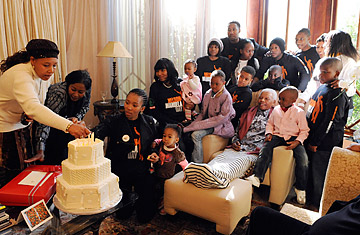
Former President of South Africa Nelson Mandela celebrates his 92nd birthday with family and friends
If it had happened a month ago, the news that Nelson Mandela's grandchildren were held up at gunpoint as they returned home from a party to celebrate his 92nd birthday in Johannesburg on Sunday might have brought South Africa crashing back down to earth amid its World Cup euphoria. This, after all, was a story with all the elements to encourage naysayers about Africa. It would have been a reminder of South Africa's raging violent crime and how it respects no one — not even grandchildren celebrating Africa's greatest living icon.
Indeed, the country had already predicted a post–World Cup hangover for itself, whether that came in the form of a large infrastructure bill, a posttournament rise in unemployment, a much rumored return of racial violence or simply a realization of the persistence of crime, AIDS, corruption and illegal immigration. A few days ago, a cartoon by South Africa's favorite satirist, Zapiro, portrayed South Africans as nervous parachutists being pushed out of an airplane door labeled "Back to Reality."
The hangover hasn't happened. It probably helped that the Mandela robbery, which took place outside the home of Mandela's daughter Zindzi, did not go beyond an attempt. The gunmen, who had fired a shot and ordered the children and their driver to lie down in the car, fled empty-handed when the driver returned fire.
Maintaining the up mood also got an assist when Finance Minister Pravin Gordhan said the World Cup brought 38 billion rand (more than $5 billion) into South Africa, exactly the amount the local organizing committee says staging the event cost. Prominent South African figures, from the opposition to civil-society leaders to Archbishop Emeritus Desmond Tutu, have urged the government to capitalize on the new national self-confidence — and the government, apparently also caught up in the mood, has duly pledged to do so. At the opening match at Soccer City on June 11, Tutu set President Jacob Zuma a target of 50,000 new homes for the 14% of South Africans who, according to the Institute of Race Relations, still live in shantytowns. On Thursday, Zuma unveiled plans not only to build 400,000 new homes by the time his term ends in 2014 but also to deliver improvements in the public-health system, particularly in treating HIV/AIDS; a new anticorruption body to speed up prosecutions of graft; and investment in more infrastructure such as power stations and public transport. "The inspiration to do more and achieve more is the primary legacy of the World Cup," said Zuma.
Some of this will no doubt turn out to be puffery — particularly, more vague commitments to improve the lot of the young and of small farmers. Skeptics are also right to question the ability of a ruling party, the African National Congress, that in 16 years in power has, by its own admission, failed to deliver a better life to millions of poor, black South Africans. But in a country where, perhaps more than in any other, the word struggle describes righteous dedication as much as poverty, it seems possible that South Africans will remember the unity, jubilation and accomplishment of the World Cup for some time to come. As Tutu told TIME on Friday, it is now the pessimists who sound out of touch. "Anyone who wasn't thrilled by the World Cup needs to see their psychiatrist," he said. "We have shown the world. We have shown ourselves. We can meet deadlines. We can build state-of-the-art stadiums. We can control crime. One has great, great exhilaration about the possibilities."
